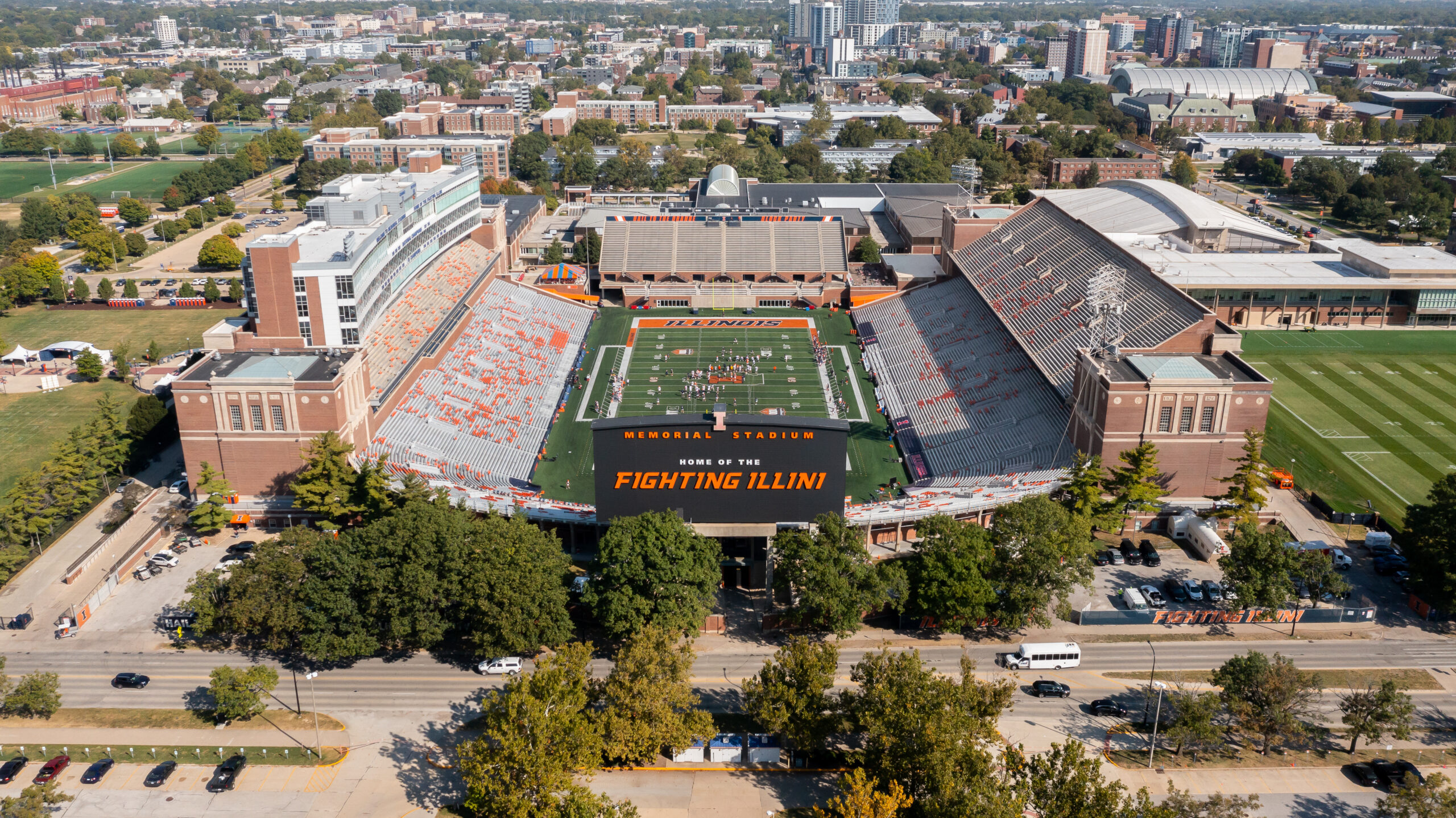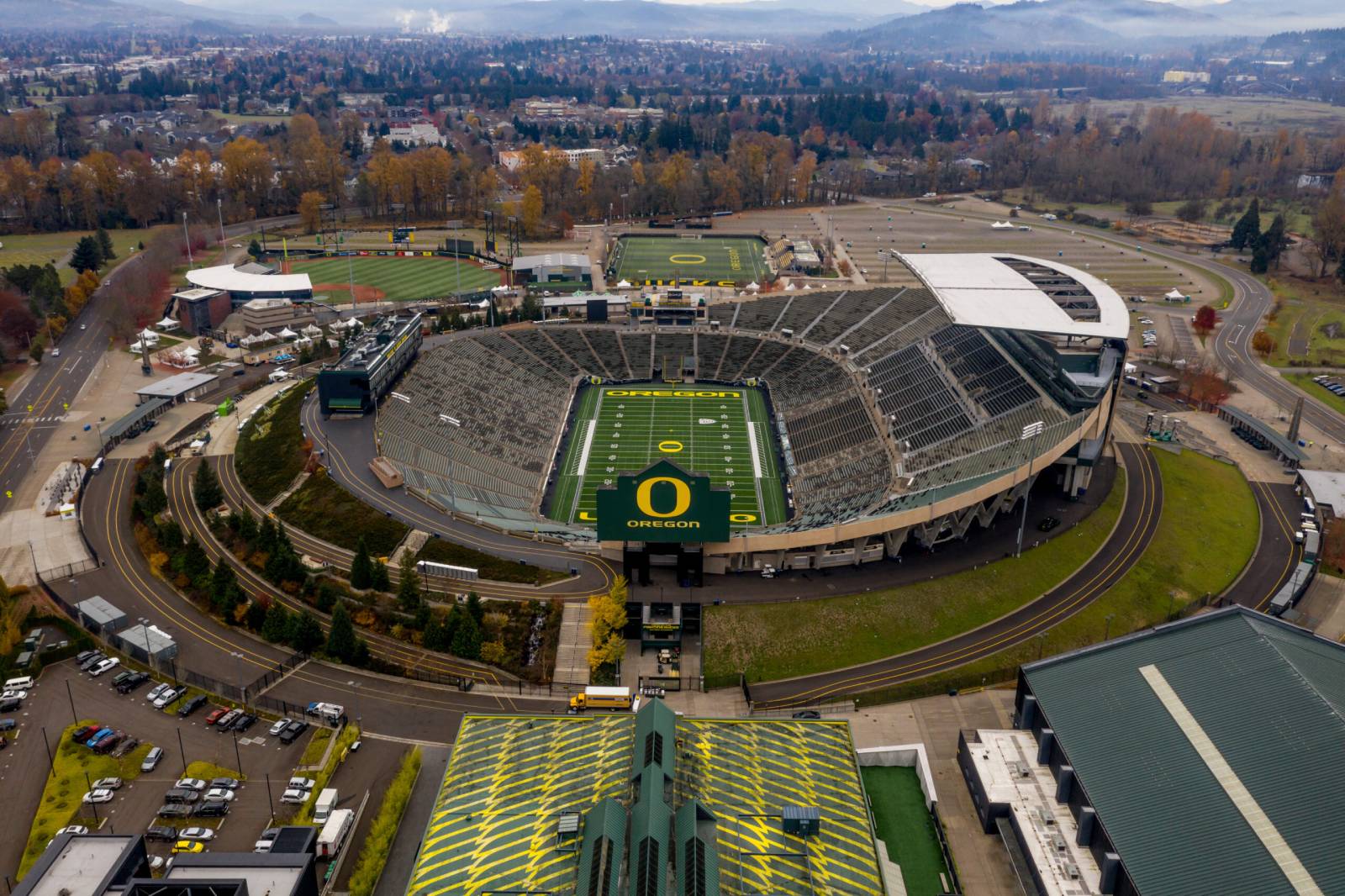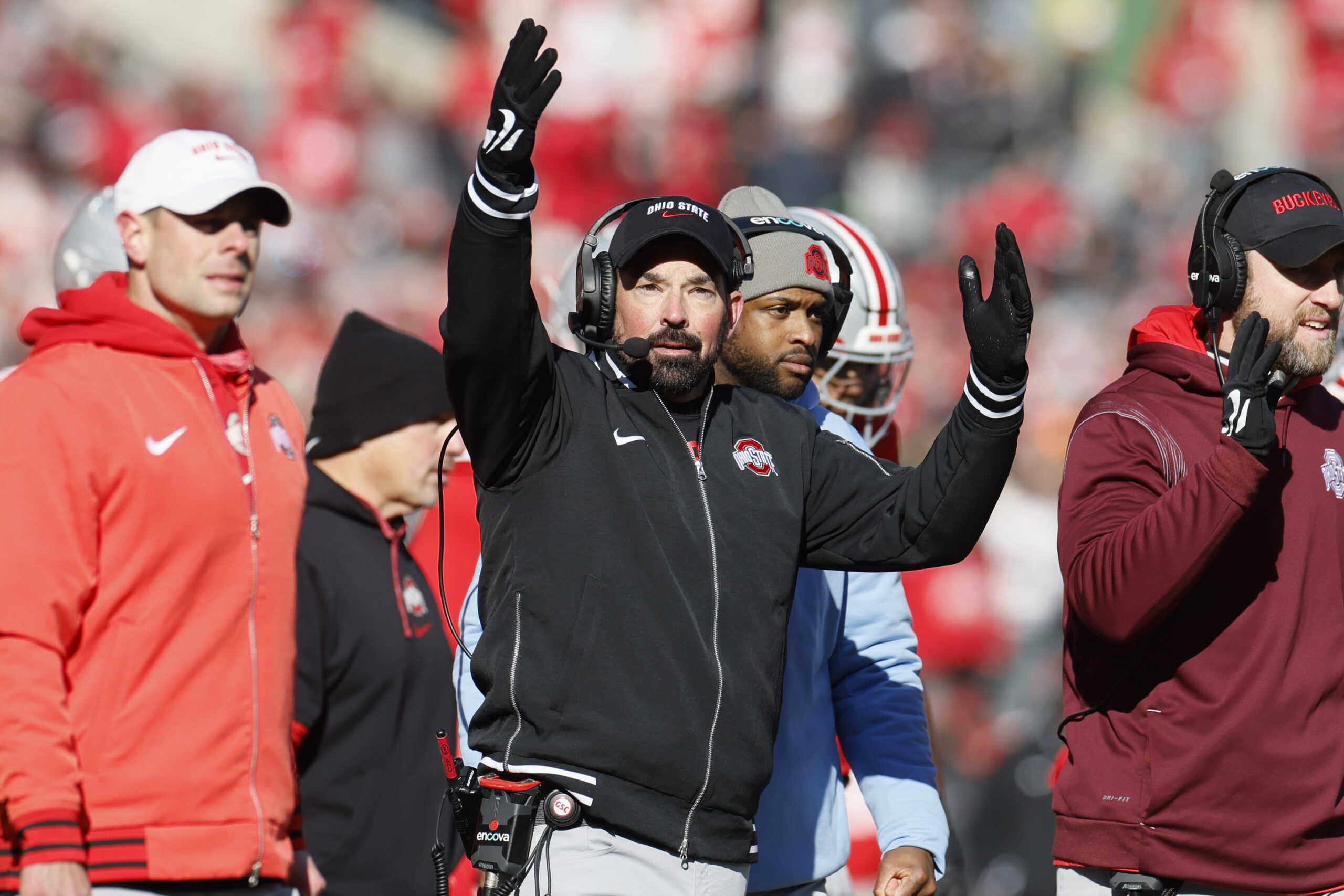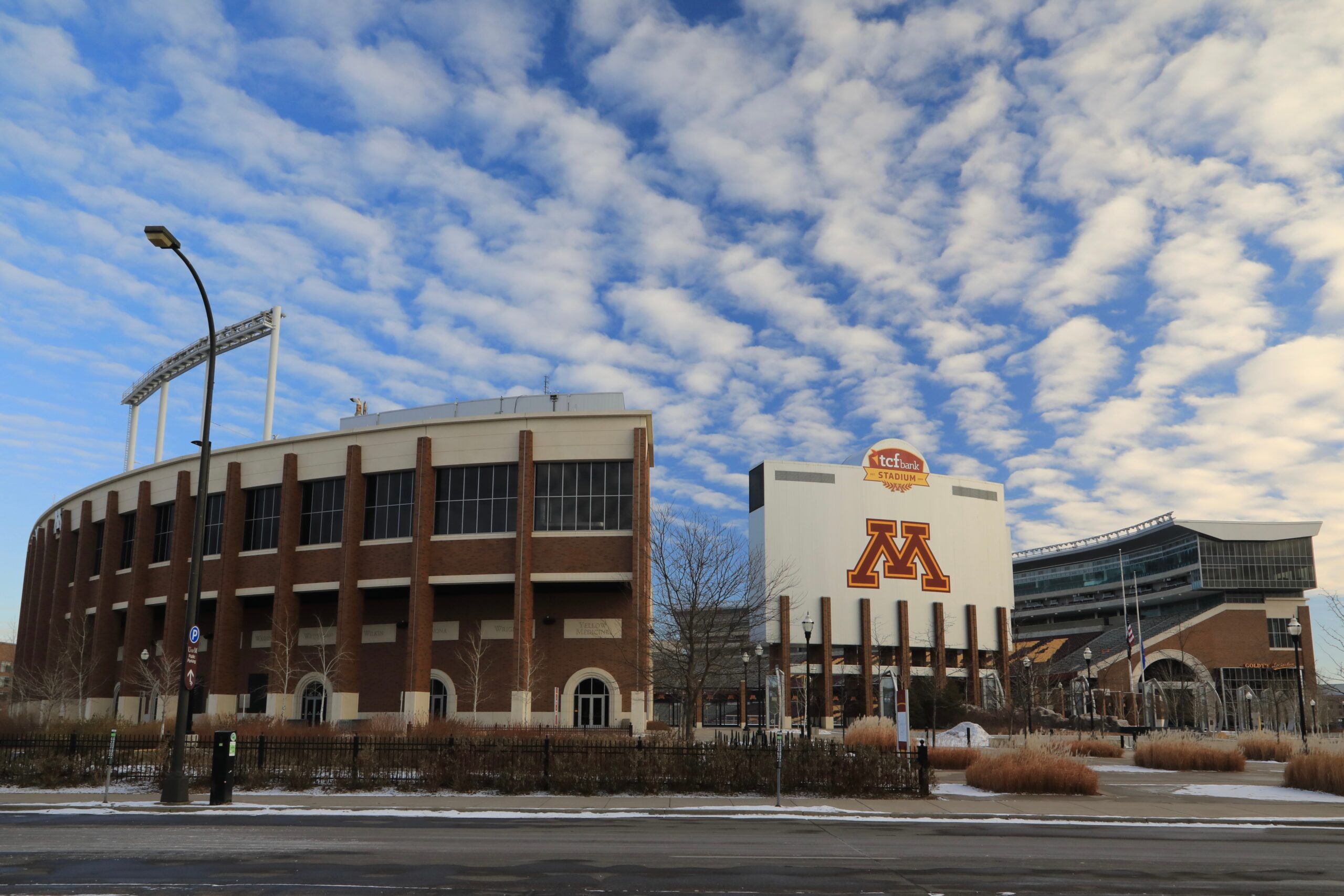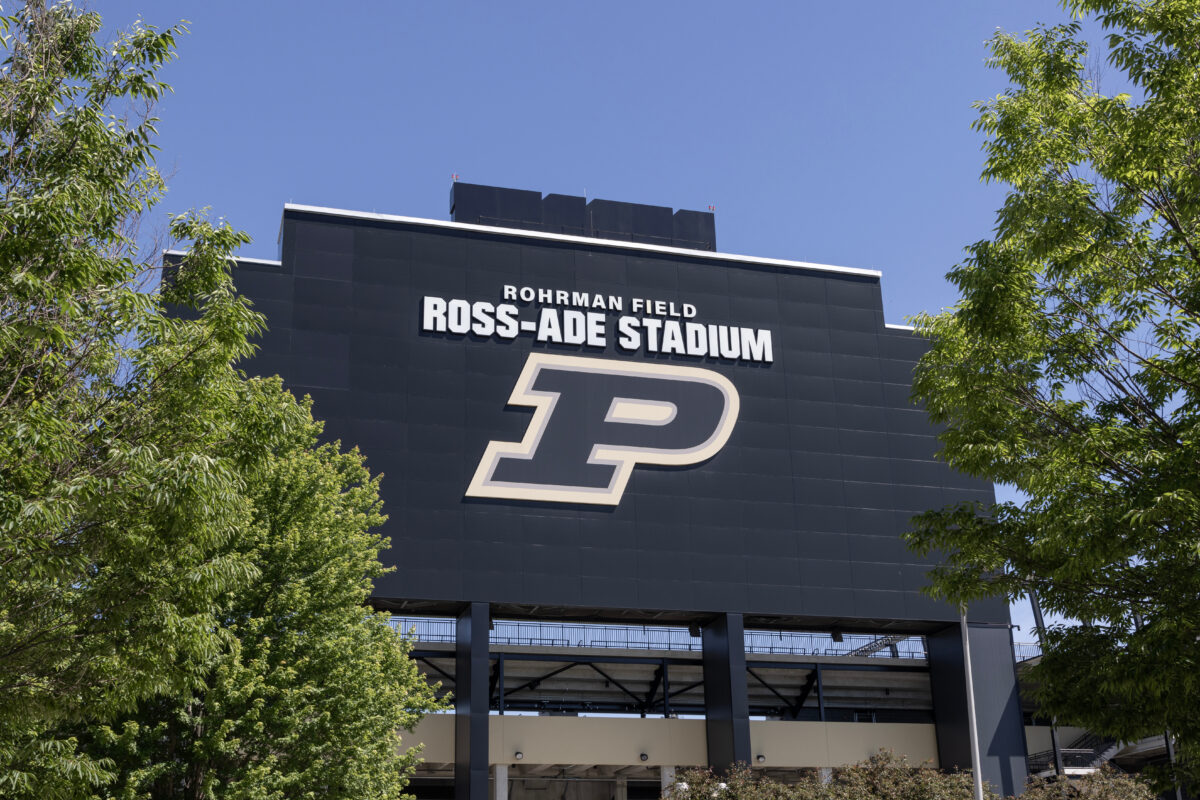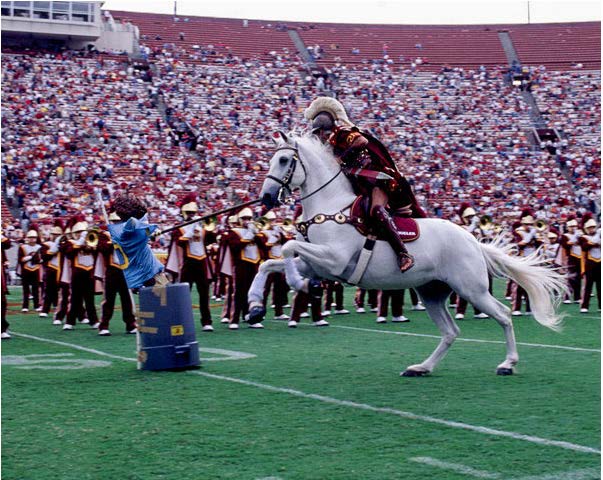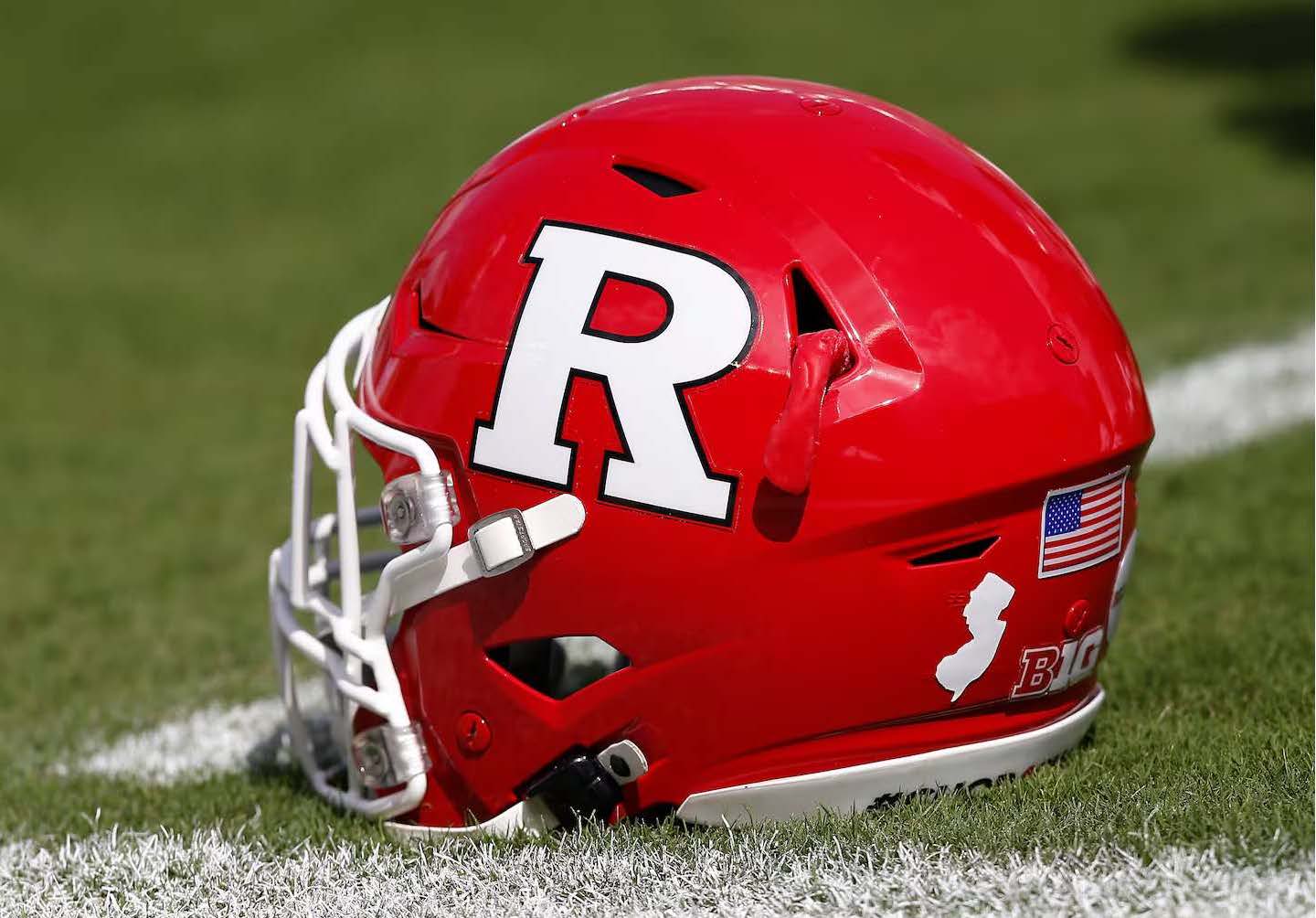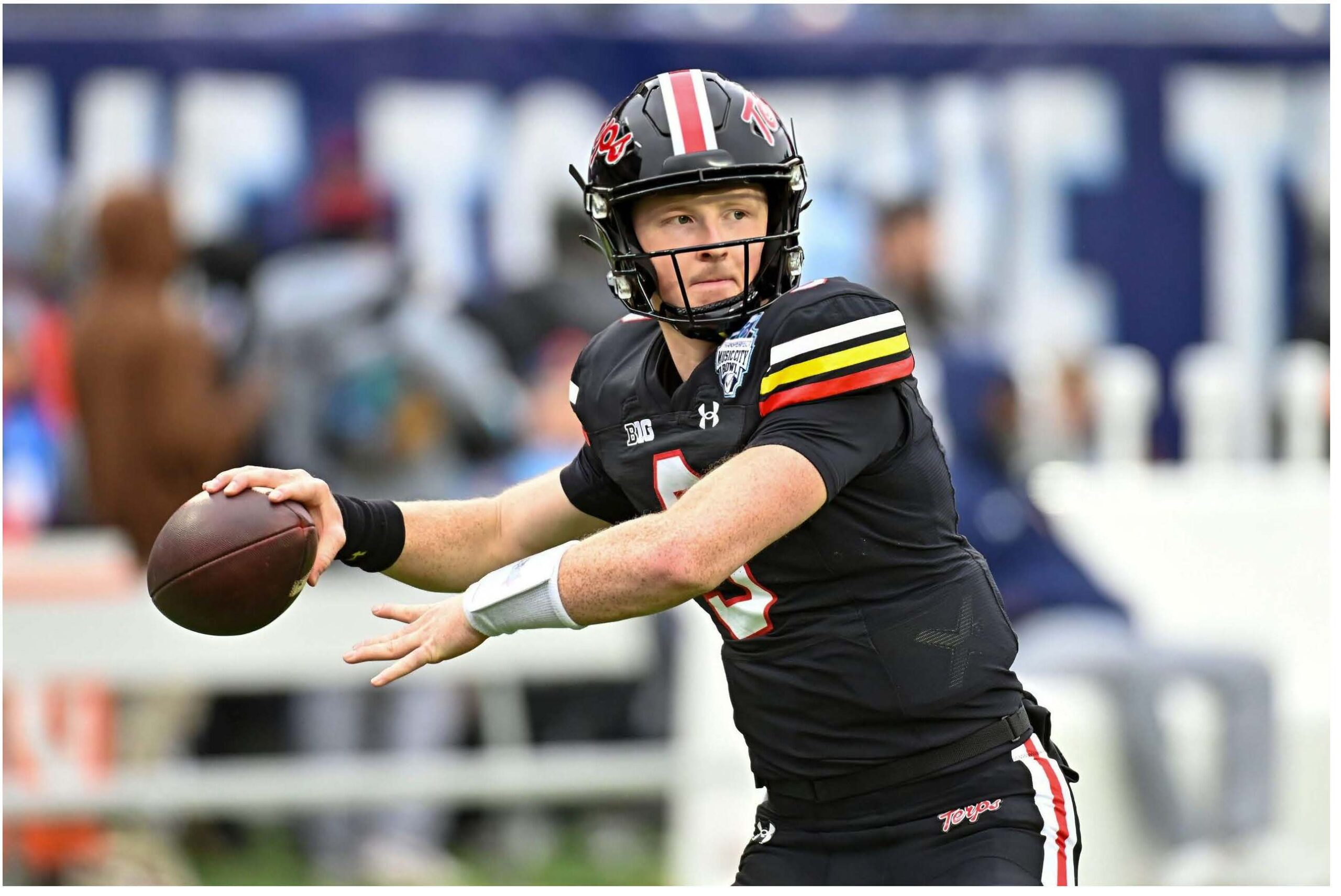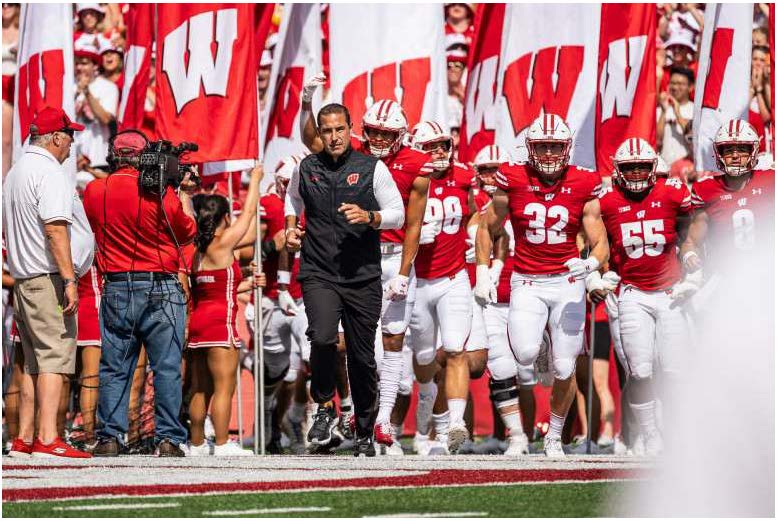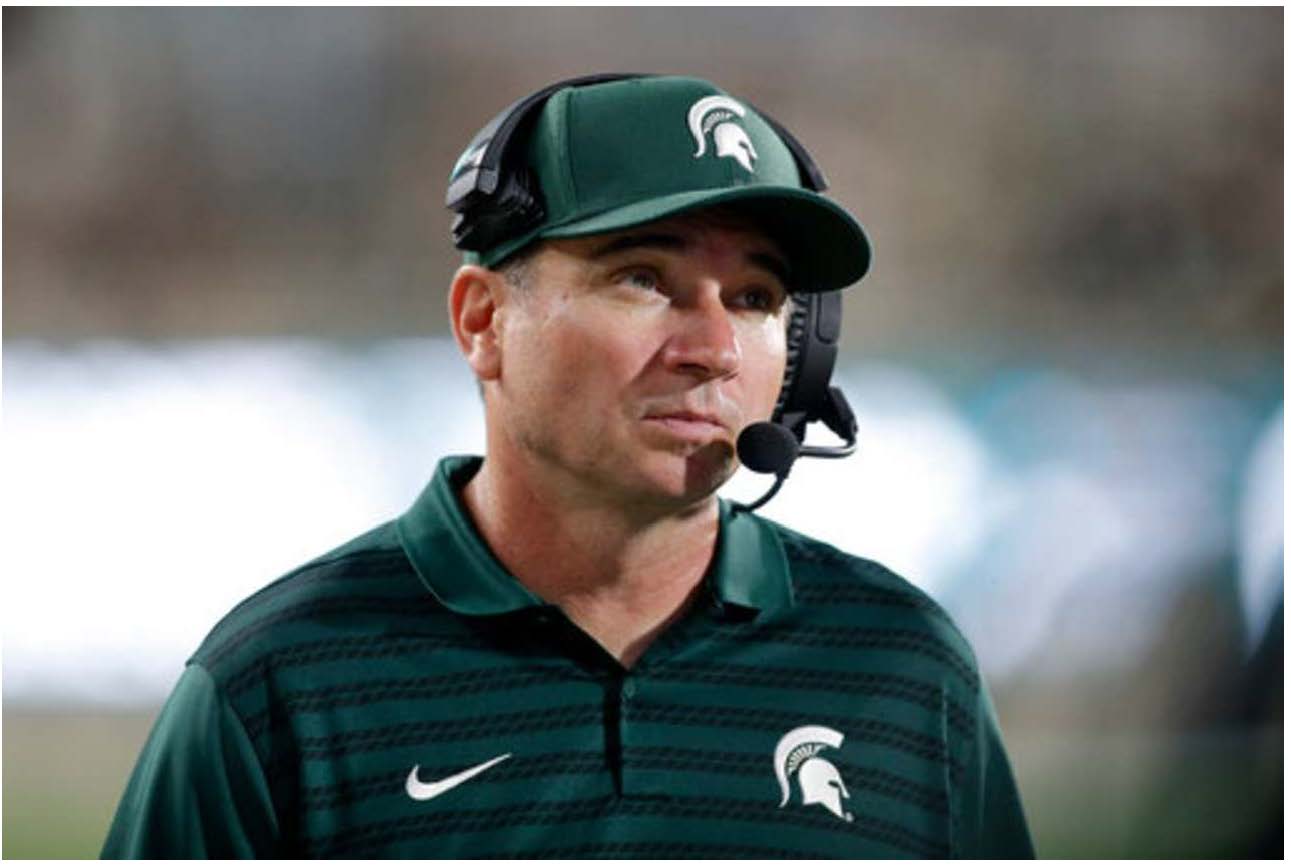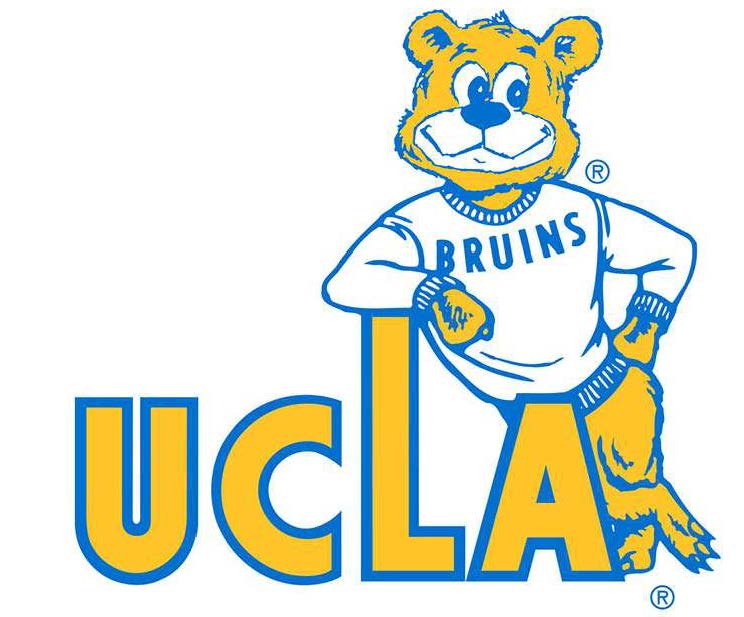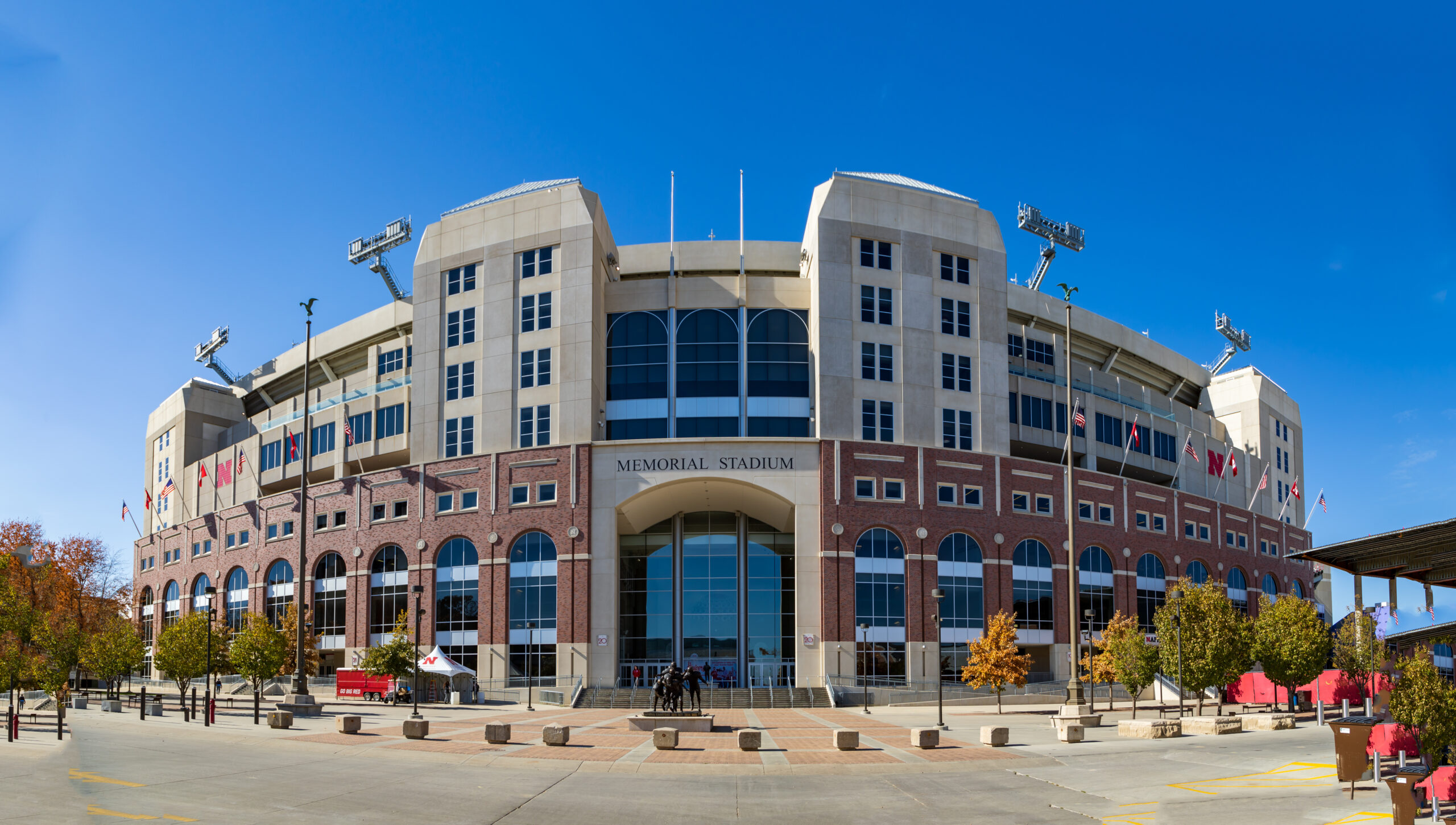
Blog Article
Michigan football stands at a critical turning point that will define the program’s trajectory for years.
As spring practice concludes in Ann Arbor, the Michigan Wolverines find themselves at a fascinating crossroads.
Following a rollercoaster 2024 campaign that ended with an 8-5 record, second-year head coach Sherrone Moore faces the challenge of recapturing the program’s championship form while integrating a wealth of new talent and implementing significant schematic changes.
The 2024 season will be remembered as a tale of two halves:
- A disappointing 5-5 start that had fans questioning the program’s direction
- Stunning upsets over No. 2 Ohio State (13-10) and No. 11 Alabama (19-13) to close the year
- Michigan is the only program to defeat Alabama twice in one calendar year
- A late-season surge that injected renewed optimism into a program that had struggled with consistency
These dramatic season-ending victories completely transformed the narrative around Michigan football heading into 2025.
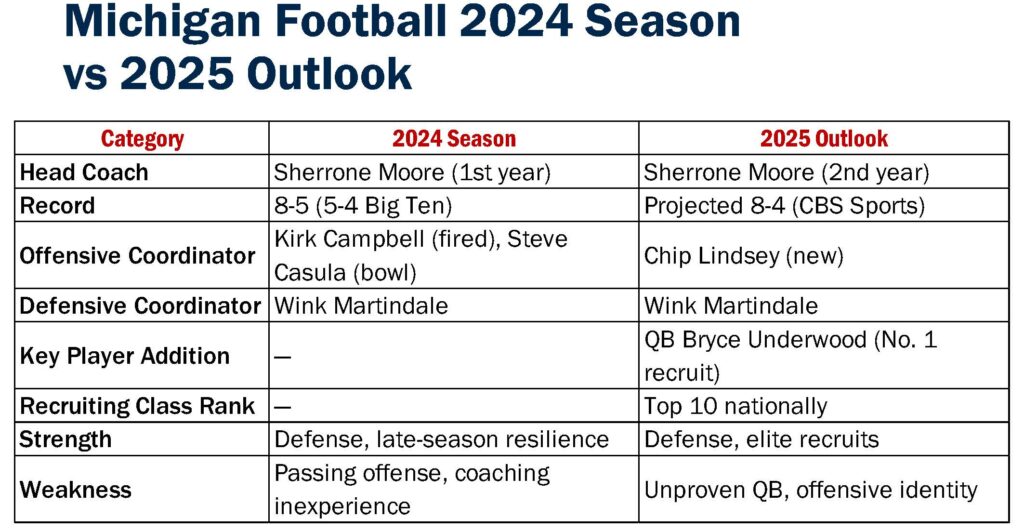
Michigan’s 2025 campaign will hinge on how quickly the offense can develop around its new quarterback and whether the defense can maintain its late-2024 form. The program’s trajectory remains positive, but the margin for error in a tougher Big Ten is slim.
Have you ever seen a program pin its entire hopes on the shoulders of an 18-year-old quarterback?
All eyes in Ann Arbor are fixed on five-star freshman quarterback Bryce Underwood, the No. 1 overall recruit in the 2025 class and the highest-rated signee in Michigan history.
Underwood’s arrival represents both immense opportunity and significant pressure. The dual-threat signal-caller is widely expected to start immediately despite his youth. His elite talent brings an electricity to Michigan that the program desperately needs after a disappointing offensive showing in 2024.
What makes Underwood’s situation different from other freshman quarterbacks?
- He joins a program just one year removed from a national championship
- Michigan’s passing attack ranked a dismal 131st nationally in 2024 (129.1 yards per game)
- Experienced transfer Mikey Keene (Fresno State/UCF) provides insurance and mentorship
- Most analysts expect Underwood to win the starting job immediately
“The quarterback situation is widely viewed as the key to Michigan’s 2025 ceiling,” according to the program’s internal analysis. “If Underwood adapts quickly and the offense improves, Michigan could contend for a Big Ten title and a playoff spot.”
Rarely has a true freshman quarterback shouldered such immediate expectations at a blue-blood program.
Michigan’s offense underwent a complete metamorphosis following one of the worst passing attacks in program history.
The offensive struggles that plagued Michigan in 2024 (113th nationally in scoring at 22.0 points per game) prompted significant changes, beginning with the arrival of new offensive coordinator Chip Lindsey from North Carolina.
Lindsey’s arrival marks a philosophical shift in Ann Arbor. His track record shows a commitment to balanced, explosive attacks. His 2023 UNC offense was one of only two nationally to average at least 290 passing yards and 190 rushing yards per game, showcasing his ability to create dynamic, unpredictable offensive systems.
The early returns from spring practice are promising:
- Sophomore receiver Semaj Morgan called the new system “night and day” compared to last year’s approach
- The new scheme emphasizes more wide receiver sets instead of heavy, predictable formations
- Greater route diversity and vertical passing concepts create more explosive play opportunities
- Running backs will be more involved in the passing game, creating mismatches
Supporting the passing game renaissance are new weapons with size and athleticism:
- 6-5 freshman Jamar Browder brings contested-catch ability
- Indiana transfer Donovan McCulley (also 6-5) adds experienced size
- Jordan Marshall (who starred in the Alabama bowl victory) returns in the backfield
- Alabama transfer Justice Haynes joins to form a powerful one-two punch at running back
While returning experienced pieces like Giovanni El-Hadi, the offensive line must improve its consistency to protect Underwood and establish the physical run game that remains central to Michigan’s identity.
Five-star freshman Andrew Babalola and borderline five-star Ty Haywood could push for early playing time and inject immediate talent into this critical unit.

While the offense rebuilds, Michigan’s defense remains the program’s unshakeable foundation.
While the offense undergoes reconstruction, Michigan’s defense is poised to remain among the nation’s elite.
The 2024 unit allowed just 19.9 points per game (4th nationally) and held opponents to 3.1 yards per rush, showcasing the physical, suffocating style that has become the program’s calling card. Wink Martindale returns for his second season as defensive coordinator after engineering late-season masterpieces against Ohio State and Alabama that saved Michigan’s season.
What makes this defense special despite losing key pieces to the NFL?
- The front seven projects to be especially formidable with returning stalwarts Rayshaun Benny, Derrick Moore, Jaishawn Barham, and Ernest Hausmann
- Despite losing unanimous All-American Mason Graham, the defensive line boasts significant depth and talent.
- While younger and less experienced, the secondary will rely on developing stars and incoming freshmen like four-star signees Shamari Earls, Elijah Dotson, and Kainoa Winston.
- Coaching continuity in Martindale’s NFL-derived scheme provides a critical foundation.
Michigan’s defensive identity perfectly complements the program’s physical ethos and should keep the Wolverines competitive even through potential offensive growing pains early in the season.
The defense isn’t just good—it’s championship caliber.

Never underestimate the impact of elite special teams in a season defined by tight margins.
Michigan’s special teams unit, anchored by returning All-American kicker Dominic Zvada, is often overlooked but is critically important to its success.
In 2024, Zvada converted an exceptional 21 of 22 field goals (95.5%) and 26 of 27 extra points (96.3%), providing reliability in close games and a consistent weapon when the offense stalled in the red zone. His clutch performances in the Ohio State and Alabama victories underscored his value to the program.
Beyond the kicking game, Michigan’s special teams provide additional advantages:
- The return game features explosive options in sophomores Semaj Morgan and Jordan Marshall
- These playmakers add another dimension to Michigan’s ability to flip field position
- Strong special teams can create scoring opportunities when the offense struggles
- In a conference with narrow margins, special teams excellence can be the difference between victory and defeat
Michigan’s emphasis on special teams excellence reflects the program’s attention to detail and commitment to winning in all three game phases.
The 2025 schedule presents a gauntlet that would challenge even the most experienced teams.
Any assessment of Michigan’s 2025 outlook must account for a challenging schedule that offers few reprieves.
Early road tests at Oklahoma (September 6) and Nebraska (September 20) will immediately test Underwood’s development and the team’s ability to execute in hostile environments. The conference slate includes road games at USC and Michigan State, home contests against Washington and a season finale with archrival Ohio State.
What makes this schedule particularly daunting:
- No consecutive home games appear anywhere on the schedule
- The constant home/away alternation complicates recovery and momentum
- Early road tests come before the team has fully established its identity
- Four of Michigan’s opponents are projected preseason top 25 teams
- The Ohio State finale comes after a long, grueling season
CBS Sports projects an 8-4 record for the Wolverines, citing roster turnover and the difficult schedule as primary factors. This conservative projection reflects the reality that even talented teams often struggle with consistency when facing elite competition week after week.
Navigating this schedule successfully would validate Michigan’s talent and coaching in a way that would resonate nationally.

For Coach Sherrone Moore, 2025 isn’t just another season—it’s the ultimate referendum on his leadership.
For Coach Sherrone Moore, 2025 represents a critical proving ground defining his tenure at Michigan.
While his job is secure following the program’s strong finish to 2024 and recruiting success (the 2025 class ranked No. 6 nationally), expectations have risen significantly. Moore ranks 14th out of 18 Big Ten coaches in USA Today’s 2025 rankings, reflecting skepticism about his inexperience despite his impressive recruiting wins.
The challenge is multifaceted:
- Moore must establish his own identity separate from Jim Harbaugh’s legacy
- His offensive coordinator hire (Chip Lindsey) represents a significant philosophical shift
- Managing a five-star quarterback’s development requires delicate handling
- The expanded Big Ten presents new challenges and unfamiliar opponents
- He must navigate a two-game self-imposed suspension due to fallout from the 2023 sign-stealing scandal
This early-season absence could impact the team’s development, particularly with a young quarterback. How Moore handles these challenges will reveal whether he’s merely a caretaker of Harbaugh’s program or a championship-caliber head coach in his own right.
The verdict on Moore’s leadership will emerge through how Michigan responds to adversity in 2025.
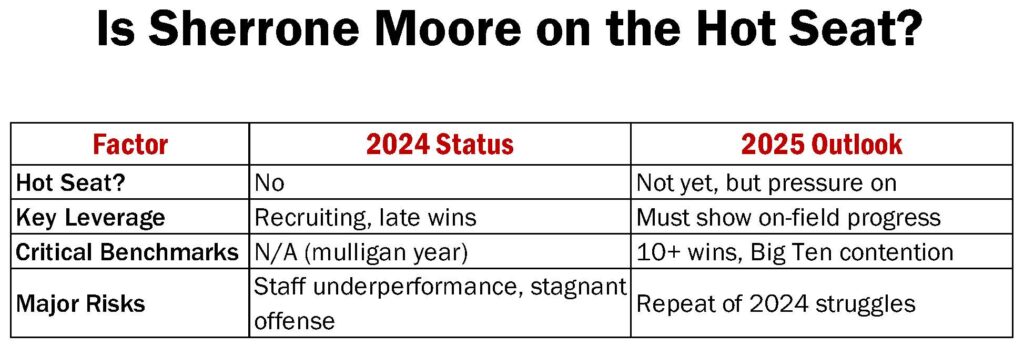
The answers to these five questions will determine whether Michigan contends for championships or faces another rebuilding year.
Several critical questions will shape Michigan’s 2025 campaign:
- How quickly can Bryce Underwood develop? The ceiling for this team largely depends on whether the freshman phenom can translate his immense talent to college production immediately. The history of true freshman quarterbacks suggests caution, but Underwood’s talent is undeniable.
- Will Chip Lindsey’s offensive overhaul yield immediate results? After ranking 131st in passing, Michigan needs dramatic improvement to compete with Big Ten powers. Schematic changes take time, but the talent influx could accelerate the transition.
- Can the defense maintain elite production despite key departures? The front seven appears loaded, but secondary depth and consistency remain concerns. Martindale’s second year should bring greater comfort in his system.
- Will the offensive line provide adequate protection for a freshman quarterback? This unit’s performance directly impacts Underwood’s development and the effectiveness of the rushing attack. The line must improve from its inconsistent 2024 performance.
- Can Michigan navigate the brutal road schedule? Games at Oklahoma, Nebraska, and USC represent significant challenges, particularly for a team breaking in new offensive systems. Road performance often separates good teams from great ones.
The answers to these questions will emerge gradually, but early-season performances will provide critical clues about Michigan’s trajectory.
Michigan stands poised between immediate resurgence and patient program building.
The contrast between optimism and caution defines Michigan’s 2025 outlook.
The influx of elite talent, particularly at quarterback, and the late-season momentum from 2024 suggest Michigan could quickly return to championship contention. Conversely, combining youth at key positions, a new offensive system, and a challenging schedule indicates potential growing pains.
What makes Michigan’s situation so compelling?
- They’re just one year removed from a national championship
- They possess championship-caliber defensive talent
- They landed the nation’s No. 1 recruit at the sport’s most important position
- They improved significantly at offensive coordinator
- They face one of the nation’s most challenging schedules
- They’re led by a head coach still establishing his identity
The talent level in Ann Arbor remains championship-caliber, the defensive identity remains strong, and the offensive ceiling is substantially higher than in 2024.
Whether Michigan can meet those expectations in 2025 or whether fans must practice patience for another season represents the defining storyline as the Wolverines embark on a new era under Sherrone Moore’s leadership, powered by a generational talent in Bryce Underwood.
Michigan’s 2025 season could ultimately be remembered as the beginning of a new dynasty or the necessary growing pains before one.
The Next Billion Dollar Game
College football isn’t just a sport anymore—it’s a high-stakes market where information asymmetry separates winners from losers. While the average fan sees only what happens between the sidelines, real insiders trade on the hidden dynamics reshaping programs from the inside out.
Our team has embedded with the power brokers who run this game. From the coaching carousel to NIL deals to transfer portal strategies, we’ve mapped the entire ecosystem with the kind of obsessive detail that would make a hedge fund analyst blush.
Why subscribe? Because in markets this inefficient, information creates alpha. Our subscribers knew which coaches were dead men walking months before the mainstream media caught on. They understood which programs were quietly transforming their recruiting apparatuses while competitors slept.
The smart money is already positioning for 2025. Are you?
Click below—it’s free—and join the small group of people who understand the real value of college football’s new economy.
